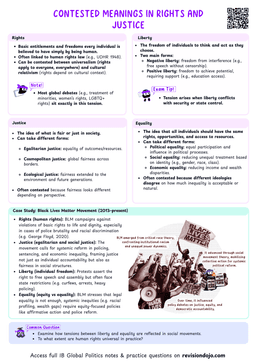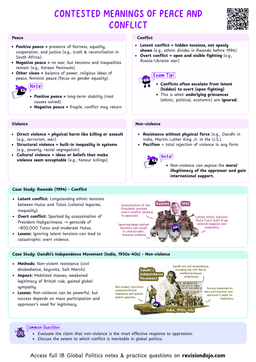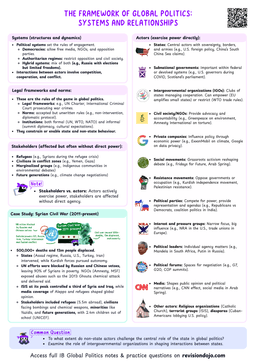Application of Theory to Political Issues
- Political theory is a framework that helps us analyze, interpret, and understand political phenomena.
- It provides lenses through which we can view complex issues, offering explanations and predictions about how the world works.
- Political theories are not one-size fits all solutions.
- They offer different perspectives, each with its own strengths and limitations.
Key Political Theories in Global Politics
Realism
- Focus: Power, security, and state interests
- Core Assumptions:
- The international system is anarchic (lacking a central authority).
- States are the primary actors, driven by self-interest and the pursuit of power.
- Conflict is inevitable due to competition for resources and security.
China’s Actions in the South China Sea
- What happened:
- China has built artificial islands, deployed military infrastructure, and asserted territorial claims over most of the South China Sea, despite overlapping claims from countries like Vietnam and the Philippines.
- Structural realist analysis:
- In an anarchic international system, China cannot rely on other states or international institutions to guarantee its security.
- By militarizing the South China Sea, China is asserting control over vital trade routes and creating a buffer zone against potential U.S. or regional threats.
- This pursuit of regional hegemony is a rational strategy to increase its security and influence, especially as the U.S. maintains a strong military presence in Asia.
- Outcome:
- China’s assertiveness leads to balancing behaviour from other states (e.g. U.S. freedom of navigation operations, AUKUS, Quad alliance), illustrating the security dilemma.
Liberalism
- Focus: Cooperation, institutions, and interdependence
- Core Assumptions:
- States and non-state actors (e.g., international organizations) are important.
- Cooperation is possible through institutions and norms.
- Economic interdependence reduces the likelihood of conflict.
The EU as a Liberal Institution
- Cooperation: Built to prevent war through economic and political integration.
- Interdependence: Shared markets and currency reduce conflict.
- Democracy & Rights: Promotes liberal values through membership rules and legal accountability.
- Institutions: Uses law and negotiation to manage disputes, not force.
- Soft Power: Spreads influence via trade, diplomacy, and aid, not military might.
Constructivism
- Focus: Ideas, identities, and social constructs
- Core Assumptions:
- The international system is shaped by socially constructed norms and identities.
- State behavior is influenced by ideas and beliefs, not just material factors.
- Change is possible through the evolution of norms and identities.
Syria and the Chemical Weapons Norm (2013)
- In 2013, the Assad regime in Syria used chemical weapons (sarin gas) in Ghouta, killing over 1,000 civilians.
- The attack sparked international outrage and threats of military intervention by the U.S. and its allies.
- Constructivist Analysis:
- The strong global reaction wasn’t just about the number of deaths (conventional weapons had already killed many more).
- It was due to the violation of a deeply embedded international norm: the taboo against chemical weapons.
- The pressure led Syria to join the Chemical Weapons Convention (CWC) and dismantle much of its stockpile, showing that norms and identities can constrain state behaviour.
Marxism
- Focus: Economic structures, class struggle, and inequality
- Core Assumptions:
- The international system is driven by economic interests and capitalist exploitation.
- Global inequality is perpetuated by the dominance of wealthy states and corporations.
- Revolutionary change is necessary to achieve equity and justice.
COVID-19 Vaccine Inequality (2020–2022)
- Context:
- During the COVID-19 pandemic, wealthy countries like the U.S., UK, and EU members secured the vast majority of early vaccine supplies.
- Meanwhile, many poorer countries in Africa, Latin America, and South Asia struggled to access doses, even for healthcare workers.
- Marxist/Neo-Marxist Analysis:
- Exposes global class divisions: rich nations (the "core") hoarded resources to protect their populations and economies, while the "periphery" was left vulnerable.
- Pharmaceutical companies (like Pfizer and Moderna) made record profits, prioritising deals with the highest bidders over public health.
- Patent protections blocked the Global South from producing its own vaccines, reinforcing dependency and capitalist control over life-saving resources.
- Shows how global capitalism privileges profit and elite interests, even in times of global crisis.
Applying Theory to Political Issues
- Identifying the Issue
- Clearly define the political issue or event you are analyzing.
- Example: Climate change, armed conflict, or economic inequality.
- Selecting a Theoretical Lens
- Choose a theory that best aligns with the key aspects of the issue.
- Consider multiple theories to gain a comprehensive understanding.
- Analyzing the Issue
- Use the chosen theory to interpret the causes, dynamics, and potential solutions.
- Highlight how the theory explains specific aspects of the issue.
- Choose a recent global event (e.g., a trade dispute or humanitarian crisis).
- Apply two different theories to analyze the event.
- Compare how each theory offers unique insights or explanations.
The Importance of Theoretical Pluralism
- Theoretical pluralism involves using multiple theories to analyze a single issue.
- This approach provides a more comprehensive understanding by highlighting different dimensions and perspectives.
- No single theory can fully explain all political phenomena.
- Combining insights from multiple theories enriches our analysis and helps us address complex global challenges.
Limitations of Political Theories
- Simplification: Theories often simplify complex realities, leading to oversights.
- Bias: Some theories may reflect cultural or ideological biases.
- Context: The applicability of a theory may vary depending on the historical and cultural context.
- How do our cultural perspectives shape our understanding of political theories?
- To what extent do theories reflect the biases of their creators?
Developing Your Analytical Skills
- Critical Thinking
- Question assumptions and consider alternative explanations.
- Evaluate the strengths and limitations of each theory.
- Contextual Awareness
- Consider the historical, cultural, and economic context of the issue.
- Recognize how different theories may apply in different settings.
- Evidence-Based Analysis
- Support your analysis with specific examples and evidence.
- Use case studies to illustrate how theories apply to real-world situations.
- How would a realist and a liberal interpret the causes of armed conflict differently, and what solutions might each propose?
- In what ways could constructivism provide unique insights into global cooperation on climate change compared to realism or liberalism?
- How might a Marxist analysis of global economic inequality differ from a liberal institutionalist perspective?
- Why is theoretical pluralism important when analyzing complex issues like terrorism or migration, and what risks arise if only one theory is applied?
- When applying political theory to a case study (e.g., the Russia–Ukraine conflict), what steps should you take to ensure your analysis is both critical and contextually aware?


